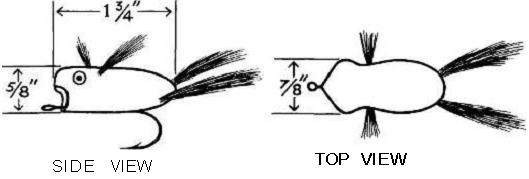Bass Fishing Spin Bugs
Recurring Headaches For Bass -
Fishing Lures Resembling
Insects And Frogs
One of the most effective bass fishing lures for black bass in fresh water is the so-called "bass bug" which is used with a fly rod.However, these bugs are too light to cast with a casting or spinning rod. But the angler who wants to use such tackle can easily make bass bugs which are heavy enough to cast.
Such fishing lures (which I will call "spin bugs" to separate them from the regular cork or plastic "bass bugs") should weigh at least 1/4 oz. or a bit more to cast well.
They are usually bulky, having hair or feathers which hold them back during the cast. Spin bugs or bass bugs are usually made to resemble some kind of insect or bug which has fallen into the water.
These are generally such big insects as dragonflies, butterflies, moths, beetles, and grasshoppers. Such insects float and kick around on top of the water, so spin bugs which do the same are the best fish-getters.
However, some of these lures are also made to resemble minnows, small fish, or frogs. The simplest type of spin bug for bass fishing one can make is a small popping bug much along the same lines as the popping plug covered for freshwater fishing.
However, the spin bugs are much smaller, shorter, and have fewer hooks. And they will have hair or feathers added to imitate the legs or wings of a bug or insect.
Another type of bass fishing lure is a silent type of spin bug which has a pointed nose instead of a cupped or slanted head.
This type of bug resembles a minnow or some other kind
of small fish more than it does a bug. It swims through the water creating a ripple like a minnow cleaving the surface of a stream or lake.
Spin bugs can also be made to imitate small frogs, which are a favorite food of black bass, pickerel, and pike. You can easily make such bass bugs as shown here.
The spin bugs described above for bass fishing are made from wood and have enough weight to cast with a light spinning or casting outfit. You can also make them from cork, but you'll have to add some lead to provide enough weight for casting.
For this you will need some sheet lead and lead wire. If you have trouble getting sheet lead you can always get some lead sinkers and pound them flat with a hammer. Lead wire can be obtained from some of the mail-order supply houses.
There are different methods of loading a cork bug with lead. For the basic construction of such a bug for bass fishing, you can obtain cork cylinders or cork bass bug bodies, already shaped and sanded smooth, from the mail-order houses and fly-tying suppliers. They come in various lengths and thicknesses, but for best results use the largest sizes.
To paint any of the wood or cork body spin bugs for bass fishing use enamels or lacquers. If you want to, dip the body three or four times in the color.
Or, if you have an airbrush, spray the bugs. A quick way to paint them is to use the fast-drying "dope" used by model airplane builders. This comes in many colors and you can add one coat after another in a short time.
Although many bass fishing lures made professionally have glass eyes, these are not really necessary. It is much quicker and less expensive to paint on the eyes or dab them on, as described for freshwater fishing lures. You can also obtain decal eyes from some of the fly-tying and mail-order houses and attach these quickly.
http://www.make-your-own-fishing-lur...s-fishing.html




 Reply With Quote
Reply With Quote